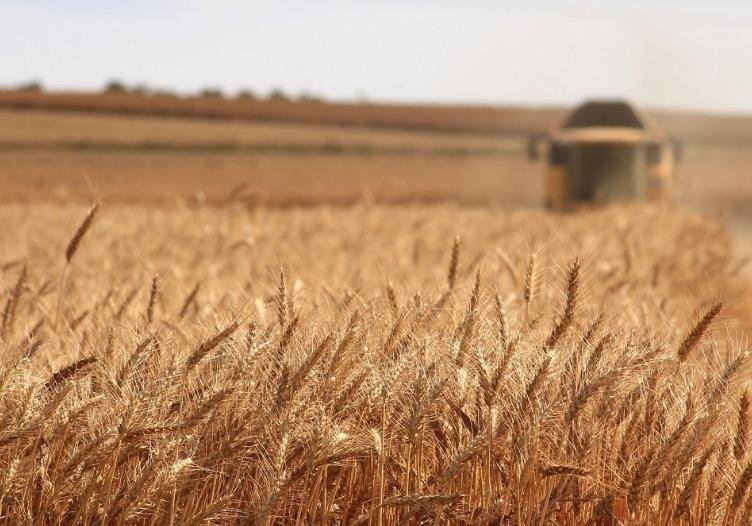After a three-month delay, Egypt has finally started loading its first shipment of Russian wheat. This marks a pivotal moment in the country’s efforts to stabilize its wheat imports amid fluctuating global prices.
Breaking the Stalemate: Shipment Details Unveiled
The shipment consists of 63,000 tons, with 17,650 tons already loaded from the Novorossiysk Grain Processing Plant in Russia. This plant is part of the OZK Group, which oversees the terminal handling the wheat. Demetra Grain Holding, another key player, holds a significant stake in the terminal, ensuring that the loading process runs smoothly.
The shipment is set to depart the port this week and is expected to reach Egypt before year-end. This timely arrival is crucial for Egypt, one of the world’s largest wheat importers, as it seeks to secure essential grain supplies for producing subsidized bread for millions of Egyptians.

Navigating Supply Chain Challenges
The delay in loading the wheat shipment was not anticipated. Sources familiar with the situation told Reuters that the holdup was due to logistical challenges and coordination issues between Egyptian authorities and Russian suppliers. However, with the shipment now on its way, these obstacles seem to be behind Egypt.
- Smooth Operations: The involvement of OZK Group and Demetra Grain Holding has been instrumental in overcoming initial delays.
- Timely Arrival: The shipment’s expected arrival before the end of the year helps mitigate any shortages in the domestic wheat supply.
The successful loading of this shipment reflects Egypt’s resilience in managing its food security needs despite global uncertainties.
Strategic Purchases Amid Global Price Fluctuations
In September, Egypt’s Ministry of Supply announced the direct purchase of 430,000 metric tons of Russian wheat at $235 per ton. This approach deviates from the usual international tender process, allowing for quicker acquisition of essential supplies. The direct purchase strategy aims to take advantage of lower global prices, ensuring that the country can secure the necessary grain without the delays often associated with traditional tender processes.
Here’s a quick look at the procurement strategy:
| Aspect | Details |
|---|---|
| Quantity | 430,000 metric tons |
| Price per Ton | $235 |
| Supplier | Novorossiysk Grain Processing Plant |
| Stakeholders | OZK Group, Demetra Grain Holding |
| Expected Departure | This week |
| Expected Arrival | Before year-end |
This strategic move underscores Egypt’s proactive stance in managing its wheat imports, ensuring that the nation remains well-supplied despite external pressures.
Shifting Responsibilities: Mostakbal Misr Takes the Helm
Contrary to some reports, sources confirmed that the wheat deal is not linked to the Air Force-affiliated Mostakbal Misr. Instead, Mostakbal Misr has recently taken over the responsibility for importing Egypt’s strategic commodities from the General Authority for Supply Commodities (GASC). This transition is part of a broader effort to streamline and enhance the efficiency of commodity imports, ensuring that essential goods like wheat are procured and distributed effectively.
The shift in responsibility aims to:
- Improve Efficiency: Centralizing the import process under Mostakbal Misr to reduce delays.
- Enhance Accountability: Ensuring clear lines of responsibility for strategic imports.
- Boost Negotiation Power: Allowing for more direct and effective negotiations with suppliers.
This reorganization is expected to facilitate smoother operations and better manage Egypt’s strategic commodity needs.
The Bigger Picture: Ensuring Food Security
Egypt’s move to secure Russian wheat comes at a critical time. With global wheat prices experiencing volatility, ensuring a steady and affordable supply is essential for the country’s food security. Subsidized bread is a staple for tens of millions of Egyptians, and maintaining a stable supply chain is vital for preventing shortages and price spikes.
In August, President Abdel Fattah al-Sisi had ordered GASC’s largest-ever tender to procure over half of its wheat needs at once. However, due to higher-than-expected prices, GASC only managed to secure 7% of its target. This shortfall prompted direct negotiations with suppliers, leading to the current deal for 430,000 tons of Russian wheat.
This proactive approach highlights Egypt’s commitment to:
- Stabilizing Prices: Ensuring that bread remains affordable for all Egyptians.
- Diversifying Supply Sources: Reducing dependency on a single supplier to mitigate risks.
- Enhancing Strategic Reserves: Building up reserves to cushion against future disruptions.
Future Implications: Strengthening Egypt’s Agricultural Strategy
Securing this wheat shipment is just one step in Egypt’s broader strategy to enhance its agricultural and food security. Moving forward, the country plans to continue diversifying its supply sources and improving its procurement processes to better withstand global market fluctuations.
The Ministry of Supply is expected to engage in more direct purchases and negotiate favorable terms with international suppliers. Additionally, efforts to modernize the agricultural sector, including investments in irrigation and farming technology, aim to increase domestic wheat production and reduce reliance on imports.
- Domestic Production: Initiatives to boost local wheat farming.
- International Partnerships: Building stronger ties with key wheat-exporting countries.
- Technological Investments: Leveraging technology to improve agricultural efficiency.
These measures are designed to create a more resilient and self-sufficient agricultural sector, ensuring long-term food security for Egypt.
